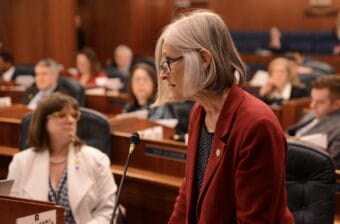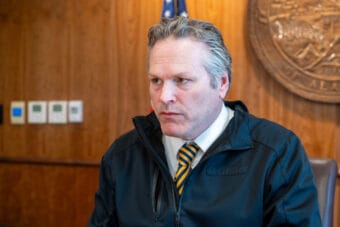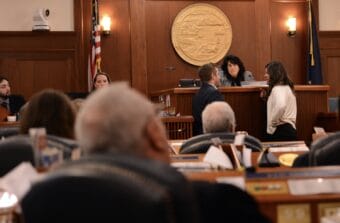
As public employees prepared to rally in front of the Alaska Capitol on Tuesday, demanding the reinstatement of a public pension system, leading members of the state Senate said their request was unlikely to be fulfilled this year.
Members of the 17-member bipartisan Senate majority said at the start of this year’s legislative session that a bill intended to improve recruitment and retention of state employees was a priority, but with only two weeks now left in the regular legislative session, Senate President Gary Stevens, R-Kodiak, said a pension bill is now expected to become law no sooner than next year.
“We started the year hoping that we could get this through this year, but I think the reality has sort of set in to realize that there’s a lot of work yet to do,” he said.
Alaska currently offers a 401(k)-style defined contribution retirement system, and the Senate’s preferred pension bill, Senate Bill 88, would create a defined benefit retirement system, commonly known as a pension, but modified to allow adjustments to benefits and employees’ required contributions in the future.
That idea still has to overcome the doubts of some senators as well as lawmakers in the House and Gov. Mike Dunleavy before becoming law, and it isn’t guaranteed that it will pass next year, either.
“Some of us haven’t concluded that a complete change is the solution,” said Sen. Bert Stedman, R-Sitka, and one of the majority’s leading skeptics.
On Tuesday, SB 88 received its first hearings in the Senate Finance Committee, where Stedman sits as co-chair.
Sen. Cathy Giessel, R-Anchorage and the bill’s lead sponsor, pointed to a front-page article from the Anchorage Daily News when talking about the need for the proposal.
That article showed the state Office of Public Advocacy declaring that it can no longer provide public guardians for disabled or handicapped Alaskans.
“We have a problem: It’s difficult to retain. It’s difficult to recruit using a defined contribution system,” she said.
“Certainly the pension issue — going back to a defined benefit — is not the single solution, but it’s certainly a big piece,” Giessel said.
Dan Doonan, executive director of the National Institute on Retirement Security, told members of the finance committee that a study examining Alaska’s teacher retention problems found that teachers were more likely to quit if they had the new 401(k)-style retirement system than if they had the old pension-style system.
The difference held up even when comparing teachers of the same age, in the same schools, with the same principals, he said.
“The turnover rates here are fairly high compared with other states and what used to be the case with the (defined benefit) plan,” he said.
Dominic Lozano, president of the Alaska Professional Firefighters Association, testified in support of the bill and said it was crafted using ideas from other states, including Wisconsin and North Dakota.
“We’ve stolen the best practices from each of them,” he said.
If implemented, Senate Bill 88 would require new employees to use the pension, while existing employees would be given the choice to stay with the current retirement system or switch to the new one.
Benefits would be guaranteed: Police, firefighters and other public safety employees would be able to retire at age 50 with 25 years of service (or at age 55 with 20 years), while teachers and other public employees would be allowed to retire at age 60 or with 30 years of service.
If the state’s pension fund begins running below the amount that actuaries believe is needed to pay benefits, a state board would be able to adjust required contribution rates to make up the gap.
Medical benefits aren’t included, which Giessel and proponents said was a compromise intended to encourage passage of the bill.
At times during Tuesday’s hearing, Stedman interrupted testimony with pointed questions about facts, figures and how the bill would function.
The state’s prior pension system was eliminated by the Alaska Legislature because of shortfalls in the pension fund that were exacerbated by mistakes committed by the state’s prior actuary.
Stedman’s questioning caused Sen. Donny Olson, D-Golovin and the meeting’s chairman, to note that the meeting was “getting kind of prickly.”
Several members of the committee noted that their decision has high stakes: The Alaska Constitution guarantees pension benefits pledged under law, and failing to properly analyze the legislation could leave the state stuck with a high price tag.
Giessel, testifying at the opposite end of the meeting table from Olson, said she understood the need for scrutiny.
“I would expect nothing less from the Senate Finance table,” she said.
This story originally appeared in the Alaska Beacon and is republished here with permission.


